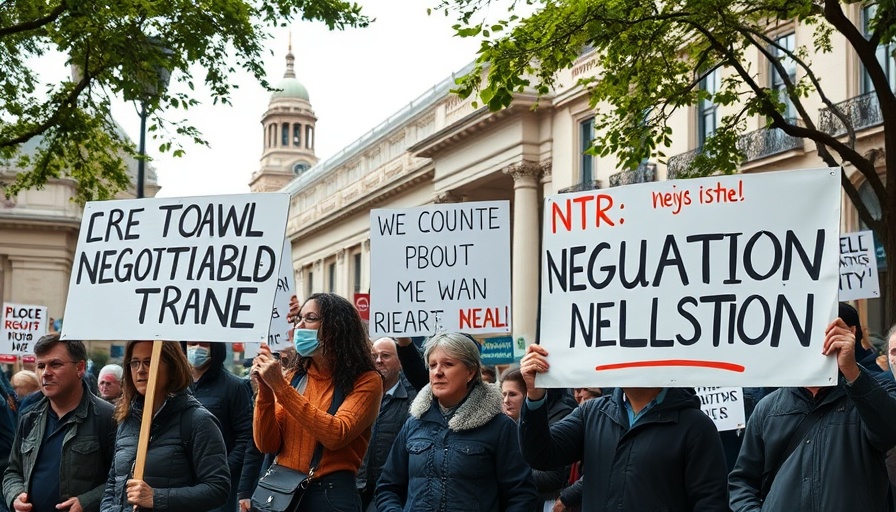
The Future of Chagos Island: A Complex Negotiation
The UK government's move to finalize a deal regarding Chagos Island, home to the controversial military base, emphasizes the intricate relationship between sovereignty and security in the geopolitics of the Indian Ocean. Under the proposed agreement, Mauritius would regain sovereignty over the islands, while allowing the UK and US military operations to continue for an extended period. The backdrop of this negotiation is a longstanding debate over colonial legacies, international law, and the rights of displaced islanders.
In 'UK is finalising Chagos deal with Mauritius,' the discussion dives into the implications of sovereignty and military presence on Chagos Island, exploring key insights that sparked deeper analysis on our end.
Historical Context and Background: Chagos Island's Controversial Status
Chagos Island, or the British Indian Ocean Territory, has a tumultuous history originating from the 1960s when the UK evicted its inhabitants to make way for a military base. The legal and ethical implications of this act have reverberated through international courts, with Mauritius asserting its claims to sovereignty over the islands. This agreement, coming as it does after significant international scrutiny, particularly from the International Court of Justice, reflects a global movement towards addressing colonial injustices.
A Double-Edged Sword: The Implications of Military Presence
While the proposed agreement would formally return the archipelago to Mauritius, its provision for continued military presence raises questions about the nature of sovereignty. Critics argue that allowing foreign powers to maintain a military base compromises the autonomy Mauritius seeks. This arrangement grants the UK and US strategic military capabilities while simultaneously putting Mauritius in a delicate balancing act between development and dependency.
Current Political Climate: What This Means for Mauritius
For Mauritius, relinquishing control of the islands could be perceived as a significant victory in reclaiming its territorial integrity, especially following decades of diplomatic activism. However, this victory could come at a cost. The public and political reactions within Mauritius to the ongoing military presence will shape future governance and international relationships. The deal's details suggest a complex interplay between national pride and economic pragmatism, forcing leaders to navigate between foreign influence and domestic expectations.
Relevance to Current Events: A Wider Reflection on African Sovereignty
The Chagos deal is emblematic of broader trends in African politics where former colonial powers are reevaluating their relationships with their former colonies. As African nations continue to assert their sovereignty, they do so amid a backdrop of foreign interest in their resources, geographical strategizing, and international alliances. This unfolding saga invites vital discussions about self-determination, legacy reparations, and the rights of all peoples in the shadow of colonialism.
Future Predictions: The Impact on Regional Geopolitics
As the UK finalizes the deal with Mauritius, the ramifications will extend beyond territorial disputes into the realm of international relations and regional stability. Given its strategic position, Chagos could become a focal point for economic and military engagement in the Indian Ocean, influencing trade routes and international maritime law. The effective management of this new partnership will set precedence for the role of military presence in the sovereign territories of African nations moving forward.
Unique Benefits or Value of Knowing This Information
Understanding the complexities of the Chagos Island negotiations sheds light on the evolving narrative of post-colonial relations and the ongoing global dialogue surrounding sovereignty. For professionals and policymakers engaged in international relations, recognizing the implications of such agreements is paramount in crafting future engagements with African nations. This case highlights the importance of transparency, accountability, and respect for human rights in diplomacy.
Call to Action: Engaging with Current Affairs in Africa
As discussions around African sovereignty intensify, it is vital for professionals to remain informed and invested in these pivotal changes. Engaging with current affairs will not only enhance understanding among stakeholders but could also impact investment strategies and political advocacy. The Chagos agreement stands as a critical moment that warrants careful scrutiny and active participation. Stay informed and be part of the conversation on governance and international relationships in Africa today!
 Add Row
Add Row  Add
Add 




Write A Comment